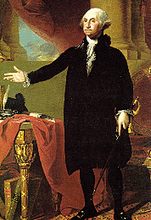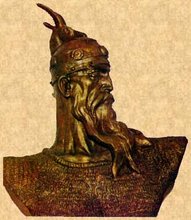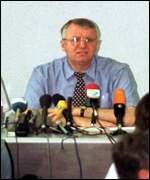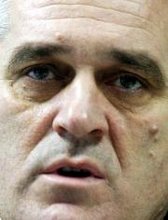PRISTINA, KOSOVO - There aren't many places in Europe where a minister of transport is a national hero whose name is sung in folk songs. But Kosovo is not an ordinary place. The country, a year old last month, is where Fatmir Limaj is succeeding at a job everyone else here has failed at: building roads. Mr. Limaj is in many ways a Kosovo story. In 1998, he took up the gun as a rebel leader, won the first real Kosovo Liberation Army battle against Serbs, and became known as "Commander Steel." He was arrested and later acquitted at The Hague for war crimes. Today, he wears dark suits and patent leather shoes, and cuts ribbons – and deals – over fresh concrete and macadam. In 2007, when Limaj became transport minister, only five miles of four-lane highway existed in Kosovo. Last year, he built eight miles, instituted 24-hour work sites, and is now overseeing the construction of eight additional miles of four-lane roadway. Kosovars love it. Limaj views the transport ministry almost as a personal ministry, a calling to build a country. He's read Barack Obama's "The Audacity of Hope," and seems to offer a "Yes, we can" message to cynical Kosovars weary of unmet promises and muddy roads. With rebel credentials in the majority-Albanian society, Limaj has knocked heads, found consensus with contractors, and mobilized a workforce. He regularly drops in on sites at midnight or later. Last year, a TV crew filmed him directing work at 3 a.m., showing the country that change was indeed under way. "I'm restless by nature, just ask my wife," he says. "Building a country was a dream of my generation. Now, I'm living that dream, but there's a lot to do. "Our people are hard workers, but they need a good manager to channel their energy." Upgrading donkey paths to modern highways An executive from a Western nongovernmental organization, who has lived in Kosovo for several years, describes Limaj as "one of the good ones.... His methods aren't typical, but they are practical, and probably what Kosovo needs right now." Roads in this agricultural society have been so haphazard and poor that travelers from northern Europe routinely got lost, even in recent years. A 21st-century road infrastructure means development. Yet a decade after NATO intervened, and despite a highway budget, little was done. Village roads remained primitive, unpaved, and a nightmare in winter. The main "highway" from the airport to Pristina was two-laned, donkey-laden, and potholed. Yet last year, Limaj's ministry paved or repaved nearly 500 miles of highway – adopting a strategy of connecting villages with one another and with key arteries. "It was so much road that we all started to wonder why it hadn't happened before," says Artan Mustafa, political editor at the Express newspaper. "Obviously, one reason is because Limaj has power. No one can say to [Commander Steel] that the road won't go through here or there. He tells you, you don't tell him." Speaking in his office near the new parliament building, Limaj explains his passion for his homeland. "I feel that 24 hours a day. It was a dream of my youth, to have a free country," he says. "If you asked me 10 years ago, I would have said that freedom was impossible. But God gave us the opportunity." Fall of Wall a test of patience Limaj's own story began when he was a student leader in the early 1990s. The Berlin Wall had fallen, but Serbian strongman Slobodan Milosevic had revoked Kosovo's special status in Yugoslavia. The Albanian, 90 percent of the population, lived a second-class existence under brutal police-state repression – checkpoints, arbitrary killing, torture – as Serbs revived a deeply felt national myth of Kosovo as their spiritual heartland, something disallowed under Yugoslavia's longtime leader, Marshal Tito. "The rest of Europe was moving in ways unimaginable to us," he says. "The spirit of East Europe was everywhere. People in Europe were breathing easier. But for us, the opposite was happening. Europe was moving forward, and we were moving backward." Public debate wasn't allowed in the new Kosovo and students rebelled. "We wanted our voices heard in federal Yugoslavia," Limaj recalls. "We wanted to warn the center how dangerous the program of Milosevic was, to stop this crackdown." For a decade, Limaj and Kosovo waited as the political and spiritual leader of Kosovo, Ibrahim Rugova, reacted to Serbian tactics with a Gandhian strategy of patience and nonviolence. A tipping point for Kosovars arrived with the US-led Dayton peace deal on Bosnia. "After Dayton, all our hopes and dreams fell," Limaj says. "That Milosevic could kill with impunity for years, then present himself as a man of peace ... this was totally depressing for us. There was no hope. We saw what he was doing here. It's true, if a normal person has choices, he would never choose war. But it was either leave Kosovo, or organize ourselves to resist." Limaj faced justice and earned respect The former commander plays down his KLA hero status. But Limaj was the first to switch KLA tactics – characterized by guerrilla skirmishes in villages and hiding in the hills – by confronting Serb forces in the open. His units eventually held two main highways and sheltered 85,000 people, a hospital, and a radio station. Last week, the Yugoslav war crimes tribunal at The Hague offered its first verdict on the Kosovo war. Four Serb generals were found guilty of using systematic force against civilians. But the tribunal acquitted then Yugoslav President Milan Milutinovic, citing Milosevic as mainly responsible: "In practice, it was Milosevic, sometimes termed the 'Supreme Commander,' who exercised actual command authority … during the NATO campaign," stated chief judge Iain Bonomy. Milosevic died in his cell at The Hague in 2006, during his defense against genocide charges in Bosnia and Kosovo. Limaj's time at The Hague remains a sensitive one. He was arrested for crimes while serving as KLA commander of the Llapushnik region. He denied guilt, but agreed to face charges. "As much as I didn't agree with the accusation, I felt it was our responsibility to respond," Limaj says. "So I said I would go to The Hague, and was sure justice would prevail." It was a lonely, worrisome time for Limaj. When he was released in 2005, he bitterly criticized Kosovo authorities for a lack of logistical legal support that he felt would have shortened his trial. "I was not going to be a man afraid of justice. But in a situation like that, you have a million thoughts running through your mind." When Limaj returned, thousands of Kosovars made a pilgrimage to his home. Two attempts to run for mayor of Pristina failed. But Prime Minister Hashim Thachi gave him the transport ministry, which he relishes. What Limaj took from Obama's "Audacity of Hope" was the new president's community organizing in Chicago. "He went house to house to understand the people, their hopes and dreams, so by the time he ran for president could speak to everybody." That will be a task in Kosovo, still divided between Albanian and Serb. "Kosovo's intentions are humane… we don't want to harm or do damage to others… but allow everyone live together in a new state." Limaj's biggest test may be ahead. Having won hearts as a man who gets things done, and whose name has been added to a centuries-old Albanian heroic folk song – he must now finish the airport road, as well as a new road to Skopje, and navigate construction difficulties. "He's won the initial battle, but now is the real test," says a UN official. Mr. Mustafa, the editor, adds that "Everybody loves Limaj, but I also long for the day when an ordinary civil servant can give an order, and it is followed." |
|
Original, by Robert Marquand, can be found at |
http://www.csmonitor.com/2009/0304/p01s01-wogn.html





















3 comments:
There is something wrong with your blog. The stories can't be read since a lot of the right end of every line is somehow covered over by the stuf in the right column.
As an Albanian I want to thank you for clearing things up and passion you have towards my country and culture. Thank you. Keep up the good work.
http://docs.google.com/Doc?id=dc2m8p62_148ghtd75db
http://pasta.cantbedone.org/pages/C3Mc5o.htm
http://www.jamestown.org/single/?no_cache=1&tx_ttnews[tt_news]=34862&tx_ttnews[backPid]=7&cHash=ed1ae9941f
Russian Forces Deploying for Possible Action in Georgia
Pavel Felgenhauer, Eurasia Daily Monitor, 16 April 2009, Volume: 6 Issue: 73
Last week Georgian opposition parties prepared to mount street protests to force President Mikhail Saakachvili to resign, while Russian forces began military exercises in the Caucasus that might be a direct preparation for an intervention in Georgia -in response to the country being further destabilized. Massive rallies by opposition supporters have not forced Saakachvili to yield and tension is mounting in Tbilisi (EDM, April 14). The possibility that radical elements on either side of the political divide in Georgia might provoke violence is high, while Russia seems to be ready to intervene to defend a brotherly Christian Orthodox Georgian nation from the Saakachvili regime, which it considers as an ultimate enemy. After the war with Georgia last August, President Dmitry Medvedev declared in an interview with Italian RAI TV, "For us president Saakachvili does not exist, he is a political corpse" (www.kremlin.ru, September 2, 2008). While in a recent BBC interview, Medvedev reiterated:
"We love and value the Georgian people. I do not want to have any relations with president Saakachvili and will not communicate with him. But if as the result of democratic processes power in Georgia changes, we are ready for discussions"
(www.kremlin.ru, March 29).
It is inappropriate for a leader of a small neighboring nation, who has been officially pronounced by Moscow as a "political corpse," to remain in power. As the Georgian opposition was gathering force, the Russian military were already on the move. The Russian Black Sea Fleet left Sevastopol, Crimea in force, lead by its flagship missile cruiser "Moskva." The Georgian Foreign Minister Grigol Vashadze accused Russia of "continuing aggressive policies" by deploying warships and reinforcing its troops in Abkhazia and South Ossetia. Vashadze expressed the hope that Russia "will not dare a new aggression against Georgia, since this will put it against the entire civilized world" (Novosti-Gruzia, April 11). Russian military officials said that the deployment of troops and warships was part of routine military exercises, while the Georgian reaction was described as "hysterical and provocative" (RIA-Novosti, April 11, 13).
It is important that the Russian military acknowledges its mobilization and forward deployment of troops and ships. At present, it is impossible to know precisely how many additional army units have been moved within striking distance of Georgian territory. However, the composition of the naval force that disembarked from Sevastopol is not secret, since the Ukrainian authorities must be informed. It seems to be larger than the force that was deployed against Georgia last August. Four large amphibious landing craft left Sevastopol last week, while in August 2008 only two were reportedly deployed to insert a regiment of marines into Abkhazia in the small port of Ochamchira, close to the border with Georgia (Vlast, August 18). The marines were later deployed in the invasion of Western Georgia.
Before the war in August, the Georgian navy was small, armed only with old ships and not ready for serious action. First Deputy Defense Minister Batu Kutelia (now Georgia's ambassador in Washington) told EDM last November that all seaworthy Georgian navy ships were moved at the start of the war from their main base in Poti, and relocated south to Batumi. The Russian navy announced it sunk a Georgian "missile ship" during a naval encounter after it attempted to attack the Black Sea flotilla (Interfax, August 10).
Kutelia says the Georgian Defense Ministry denies knowledge of such an encounter. Georgia did have two small guided missile ships: an old Soviet vessel "Tbilisi" and an even older French-build ship "Dioskuria." Both were left stranded in Poti and sunk in port by the occupying Russian army. Recently the wreckage of these ships has been auctioned off for $61,000 for salvage as scrap metal to clear the Poti harbor (Interfax, April 3). In the view of the Georgian Ministry of Defense, the naval encounter reported by the Russian navy last August was either a propaganda ploy, or simply a delusion.
After the war, Georgia disbanded its navy, handing over its surviving ships to the local coast guard. The Russian naval flotilla led by "Moskva" will not find any opposition at sea, but the deployment of a large amphibious force formed of thousands of marines armed with heavy weapons on board is a threatening sight. The low capacity narrow roads leading from Russia into Georgia (one into Abkhazia and another leading into South Ossetia) create immense logistical problems in rapidly deploying large military contingents into Georgia if Moscow opts for a "humanitarian intervention" to bring about "regime change." The insertion of a sizable marine force with heavy weapons was used last August to bypass the clogged up overland routes and this could prove important again. The Russian military knew beforehand the exact timing of its pre-arranged invasion and fully controlled the pre-war armed provocations by the South Ossetian forces, whereas in the present crisis the situation is much more volatile.
Saakachvili and his ministers have been expressing confidence that the present Russian military deployments are a game of bluff, and that Moscow will not risk an attack that hinders the "resetting" of its relations with Washington (Novosti-Gruzia, April 2). But from Moscow's perspective only a tacit acceptance by the United States of Russia's dominance of the South Caucasus and control of energy transit routes from the Caspian and Central Asia is a prerequisite of any "reset." Washington's acceptance of Russia's dominance over these regions might be the unspoken precondition for a genuine improvement in bilateral relations.
Post a Comment